Best healthy late night snacks for weight loss
You might think that eating at night will do your waistline no favours but are there healthy late night snacks for weight loss?
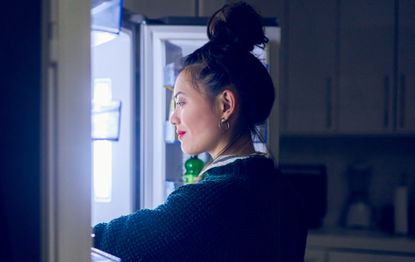

You might think that eating at night will do your waistline no favours but there are healthy late night snacks that aren't bad for weight loss.
Often, night time is when we feel the urge to nibble and it's not always healthy snacks that we reach for. Feeling tired, stressed or even bored in the evenings all lead to overeating and the abandonment of even the best-planned diets, which in turn leads to gaining weight.
While reaching for unhealthy, sugary foods before bed isn't good, no one likes to go to bed with a growling stomach so what are the best late night snacks that can also help weight loss?
What are the best healthy late night snacks for weight loss?
Registered Nutrition Professional Sophie Bertrand recommends:
- Banana with nut butter
- Handful of nuts
- A small bowl of porridge
- Seeds
- Berries
Your body requires a set number of calories throughout the day to fuel your energy needs. To lose weight you need to get a deficit of those calories, which means consuming less calories than you burn. But that doesn't mean you can't eat at night – there are some healthy late night snacks that you can consume without risking weight gain.
'There are no specific foods that you can eat in order to aid weight loss,' says Sophie, co-author of Forking Wellness: Your No-Nonsense Guide to Health and Nutrition. 'However, you can help nourish your body and maintain a healthy weight by opting for snacks that won't spike your blood sugar before bed,' she explains.
Bari adds: 'Ensuring you have enough protein and fibre with each snack will help to stabilise your blood sugars – preventing any blood sugar spikes – and will keep you feeling satisfied until morning'.
GoodtoKnow Newsletter
Parenting advice, hot topics, best buys and family finance tips delivered straight to your inbox.
Plus, if you feel full on healthy snacks, you won't overeat on unhealthy ones.
What many nutritionists agree on, is that if you enjoy snacking, look at whether you need to adjust the portion sizes and the types of foods you eat at mealtimes. If you tweak these so you're not overeating you can afford to eat calories between meals.
Just be aware that everyone is different. 'It's important to recognise that portions will vary from person to person due to their hunger levels, what else they ate during the day, exercise habits, personal preferences, and goals,' says Bari.
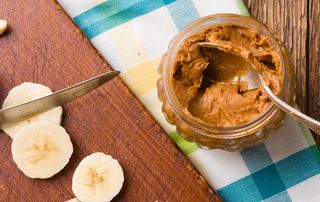
Healthy late night snacks ideas
Banana & peanut butter
- Calories: 210 calories
- Portion size: 1 sliced banana, 15g of peanut butter or almond butter
'Nut butters are delicious and contain healthy fats,' says Simon Jurkiw, Performance Nutritionist at bulk. Aim for a butter made with 100% nuts that doesn’t include any added sugar or salt.
'Any type of nut butter is a good source of fibre and essential fats which will help keep you satisfied,' adds Sophie.
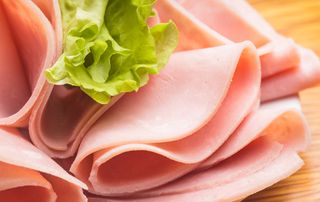
Turkey lettuce leaf wrap
- Calories: 115
- Portion size: 3 slices turkey, a few lettuce leaves
'Turkey contains tryptophan, which is an essential amino acid that helps your body make 5-HTP, which in turn helps your body make the happy hormone serotonin,' explains health expert Katy Sunnassee. 'This is then converted into melatonin – the hormone that triggers your body to fall asleep. All sounds complicated and science-filled, but all you need to know is turkey can help aid better sleep.'
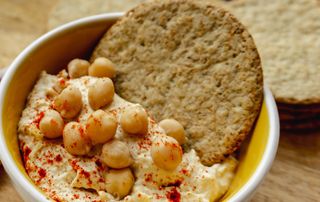
Oatcakes & hummus
- Calories: 140 calories
- Portion size: 2 oatcakes, a thin spread of hummus
'Oats provide some tryptophan but also contain slow-releasing carbs to help balance blood sugar levels, alongside some protein in the hummus, so you’ll feel calm and balanced rather than on edge,' says Suzie Sawyer, clinical nutritionist. On top of that, a study by Columbia University found that a higher fibre intake was linked to deeper sleep. Good sleep = less cravings the next day.
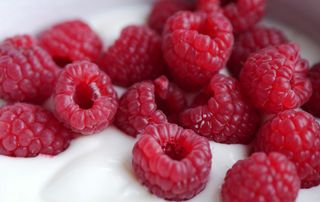
Greek yoghurt with raspberries
- Calories: 216
- Portion size: 150g Greek yoghurt, 50g fresh raspberries
'Dairy products contain the amino acid tryptophan which can help regulate serotonin and melatonin in the body – the hormones needed to aid sleep. Pairing it with raspberries adds a fibre boost (there is 4g fibre in this snack, and 8g protein) and added antioxidants,' says Sophie.
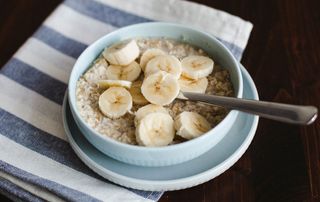
Porridge & banana
- Calories: 190
- Portion size: 15g serving of porridge blended with 1tsp unsweetened cocoa powder, a little honey, a sliced banana
'Creamy, fibre-filled oats can aid sleep, plus oats are filling so you're less likely to wake up hungry. The magnesium, potassium and vitamin B6 in bananas can also help with sleep,' says nutritionist Rob Hobson.

Chia seed pudding
- Calories: 150 calories
- Portion size: 2tbsp chia seeds, 120ml almond milk, a little honey
'Chia seeds are rich in fibre, protein and good fats as well as magnesium, all of which help you stay sated and help contribute to a good night's sleep,' says Katy. 'Try soaking some in almond milk until you have a squidgy jelly-like consistency. Top them with some cherries for the ultimate snooze snack.'
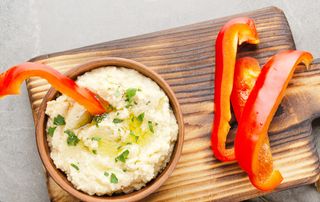
Hummus & red pepper
- Calories: 101
- Portion size: 50g hummus, 1 sliced pepper
This chickpea-based dip makes an appearance again because 'it makes for a delicious late night snack (though it's best eaten in moderation), plus the fibre in hummus can help with sleep,' says Rob. Peppers also provide fibre and are a source of potassium, which is thought to encourage sleepfulness.
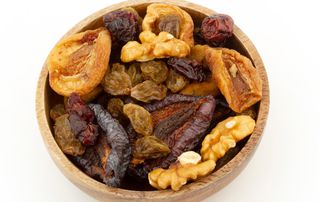
Walnuts & dried fruit
- Calories: 243
- Portion size: 30g walnuts, 20g dried apricots
'Walnuts are rich in healthy fats, antioxidants, and promote a healthy gut,' says Bari. 'They also contain tryptophan, which helps your body produce melatonin and has a positive impact on your sleep cycle. Additionally, the dried fruit adds sweetness.'
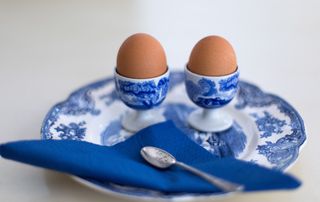
Boiled eggs
- Calories: 156
- Portion size: 2 medium-sized eggs
Eggs are also a good source of tryptophan which, as Katy previously explained, triggers a chemical process that produces the sleep hormone melatonin. Rob recommends serving these with a sprinkle of celery salt or smoked paprika for added flavour.
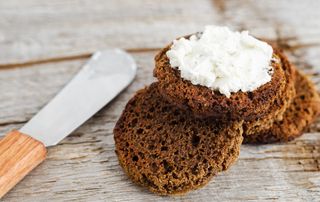
Cottage cheese on rye
- Calories: 110
- Portion size: 30g cottage cheese, 1 slice of rye bread
A study by Florida State University found that 30g of cottage cheese before bed improved metabolic rate and muscle recovery. A higher metabolism is helpful for weight loss, so ignore the 'no cheese before bed' myth.
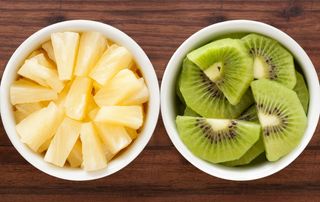
Kiwi fruit & pineapple salad
- Calories: 147
- Portion size: 1 kiwi, 3 slices pineapple
'Both these fruits contain small amounts of serotonin, which is the hormone associated with feeling relaxed and happy,' explains Katy. 'As mentioned, serotonin can be converted into melatonin, the sleep hormone. Go for fresh fruits though rather than tinned, as tinned varieties are often in water that contains added sugar. Plus, they can have a lot of fibre removed, which is what helps keep you full so you don't wake up hungry.'
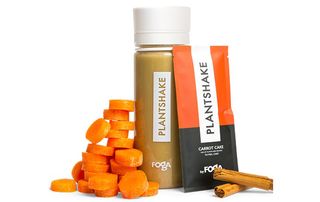
Foga Carrot Cake Protein Plantshake
- Calories: 97
- Portion size: 1 sachet
Mix this Foga shake with water for a healthy, nutrient dense snack that's light on the stomach. Pea protein is great for muscle recovery, so it's perfect for drinking after an evening workout. Carrots help promote immune health whilst cinnamon has anti-inflammatory effects, which may help lower the risk of certain diseases.
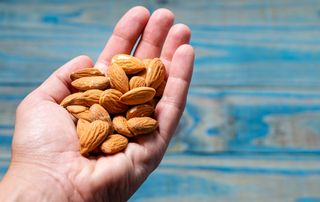
A handful of almonds
- Calories: 191
- Portion size: 30g almonds
'Almonds are high in protein, so balance blood sugar and encourage calm sleep,' says Suzie. 'People often wake around 4am which can be triggered by hormonal fluctuations. Almonds are a good source of calming magnesium which also helps you to stay asleep.'
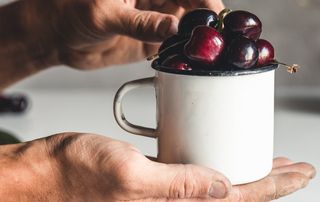
Cherries
- Calories: 39
- Portion size: 15 cherries
'Melatonin helps your body fall asleep and cherries are already abundant in this substance,' says Katy. 'Melatonin is produced naturally by the pineal gland in your brain – it's this mechanism that helps tell your body it's time to shut down for the day and sleep. You can find plant-based melatonin in a variety of foods but cherries are a particularly good source. Have a handful an hour or so before bed. You could also use frozen ones to make into a smoothie.'
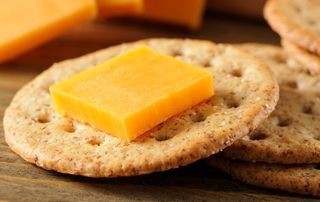
Cheese & crackers
- Calories: 152
- Portion size: 20g Cheddar cheese, 2 crackers
'Cheese is a great source of protein (there's 7g of protein in this snack), and when combined with rye crackers the protein and complex carbohydrate combination ensures no sugar spikes before bed,' explains Bari. 'Plus, it leaves you feeling satisfied until the morning. Furthermore, cheese is also a great source of tryptophan and calcium, which helps ensure you have a good night's sleep.'
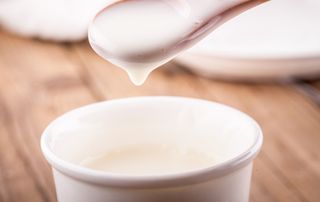
Organic soya yogurt
- Calories: 43 calories
- Portion size: 100g
'Soya contains the amino acid tryptophan. This is needed to produce melatonin (our sleep hormone), so it’s going to encourage some good shut-eye,' says Suzie.
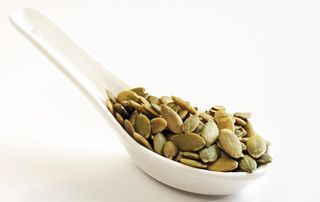
Pumpkin seeds
- Calories: 170
- Portion size: 30g pumpkin seeds
'Pumpkin seeds are rich in the mineral magnesium, which is crucial for helping your body relax and fall asleep,' says Katy. 'It's also worth having a bath containing magnesium flakes before bed,' she adds. Or try the new beauty craze, magnesium butter.
'Try soaking them for a few hours, straining off the water, then adding them to a chia pudding. Soaking helps deactivate the phytic acid, which is difficult on your digestion.'
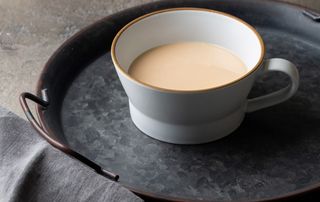
Warm malted milk
- Calories: 125
- Portion size: 100ml of skimmed milk, 25g powdered malt such as Horlicks
'It’s not just an old wives’ tale’ – a warm milky drink really does help you sleep,' says Suzie. 'This is because milk is rich in tryptophan and malt contains magnesium, so the combination is going to encourage rest and relaxation.'
What should I eat before bed to lose weight?
'Not all calories are created equally so you should choose foods that are nutrient dense to help keep you feeling full between meals,' says nutritionist Rob. 'Keep your evening meal simple and light and include protein, a little carbohydrate, healthy fats and plenty of veggies. This might be a protein-based salad with a little sweet potato or grain added, a protein-based stir fry, or a one-pot dish, such as veggie chilli served with basmati rice,' he says.
Suzie reiterates the importance of eating protein in the evening. 'Foods high in protein, especially the amino acid tryptophan such as chicken and turkey, will block a strong insulin response and also encourage melatonin production,' she explains. 'Protein also triggers the satiety hormones; therefore, you’ll feel fuller for longer, making you less likely to binge on high calorie snacks.'
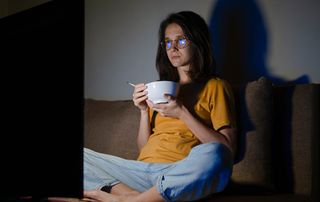
The link between sleep and weight
Interestingly, research suggests that sleep may play a role in the development of obesity or being overweight.
'Research suggests that people with poor sleep tend to struggle to maintain a good weight; what we eat during the day, especially during the evening, has a big impact on how well we sleep and having sufficient sleep is key to good weight management,' says clinical nutritionist Suzie.
Rob says: 'This doesn't mean that if you're overweight then you will definitely put on weight – only that there is some sort of link. Of course, if you're tired from not sleeping then you may be more inclined to reach for sugary snacks and drinks to boost your energy or even eat more erratically, as well as the fact that fatigue could hamper your motivation to eat well and exercise.'
For an easy way to fall asleep, try to include a good source of tryptophan in your healthy late night snack such as the ones our experts have suggested in this article. 'Include a source of carbohydrate, too, as this helps with the uptake of tryptophan to the brain,' says Rob.
For some people, avoiding certain foods can help them sleep better. 'It’s best not to eat foods containing gluten, such as bread or pasta, for dinner,' says Suzie. 'Many people have problems digesting them, causing digestive upsets and trouble sleeping.' If this rings true, try avoiding gluten before bed to see if it makes a difference to your slumber.
Suzie also extols the virtues of low GI food. 'Foods low on the glycaemic index – meaning energy is produced in a slow and sustained manner – such as oats, nuts, yoghurts and dairy produce won’t over-stimulate the body and prevent sleep,' she says.
'It’s also important to consider minimising certain foods that may inhibit your sleep, such as a food high in simple sugars or caffeine,' adds Sophie.
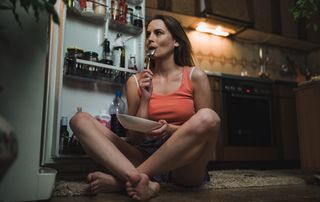
Is eating late at night bad for weight loss?
In essence, no. 'As long as you're eating the right amount of food to supply you with the energy your body needs to get you through the day then eating late at night shouldn’t really have an impact on your body weight,' says Rob.
In fact, your body doesn’t shut down when you go to sleep – it continues to burn energy.
'Binging or excessive snacking at night, however, will add unnecessary calories to your diet and regardless of whether you eat them at night or during the day they will lead to weight gain,' warns Rob.
Simon agrees: 'The total amount of calories you consume in a day, versus the total amount of calories you burn, is what ultimately affects weight loss and weight gain. Eating the same meal at 6pm or 9pm doesn’t make a difference, as you’re still consuming the same amount of calories. It's important we're in a calorie deficit if we want to lose weight, but when we eat is down to personal preference. It won't have a direct impact on our weight loss,' he says.
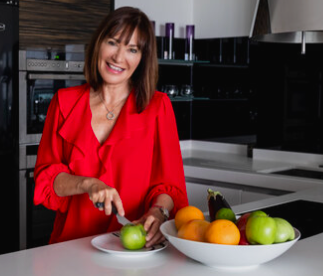
Suzie Sawyer is a nutritional expert with more than 20+ years of experience. Specialising in female health and food supplements, she is a member of the British Association for Applied Nutrition and has a diploma in nutrition from the Institute for Optimum Nutrition, London. Suzie has been featured in a range of title, including Women’s Health, woman&home, Women, Women’s Own, and Daily Mail.

Rob Hobson is an award-winning registered nutritionist, with more than 15 years experience. Accredited by the AFN and SENR, he also has degrees in nutrition, public health nutrition and sports nutrition. Rob is a published author of three successful books, Unprocess Your Life, The Detox Kitchen Bible and The Art of Sleeping. He has acted as Head of Nutrition at Healthspan since 2013.

Debra Waters is an experienced online editor and parenting writer. She also has a strong background on health, wellbeing, beauty, and food. She currently writes for Goodto and Woman&Home, and print publications Woman, Woman’s Own, and Woman’s Weekly. Debra has written for What to Expect, Everyday Health, and Time Out. In addition, she has had articles published in The Telegraph and The Big Issue.
-
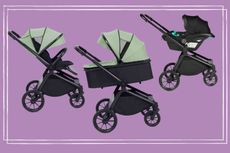 What is a travel system? Baby gear experts explain how they work - and what’s included
What is a travel system? Baby gear experts explain how they work - and what’s includedExperts decode what is a travel system and offer tips on how to find the best one for you
By Charlotte Duck Published
-
 Magic Mixies Pixlings are a bestseller - but are they worth the money? We put this toy through its paces to find out
Magic Mixies Pixlings are a bestseller - but are they worth the money? We put this toy through its paces to find outMagic by name and magic by nature? We review Magic Mixies Pixlings to see if it lives up to the hype
By Sarah Handley Published